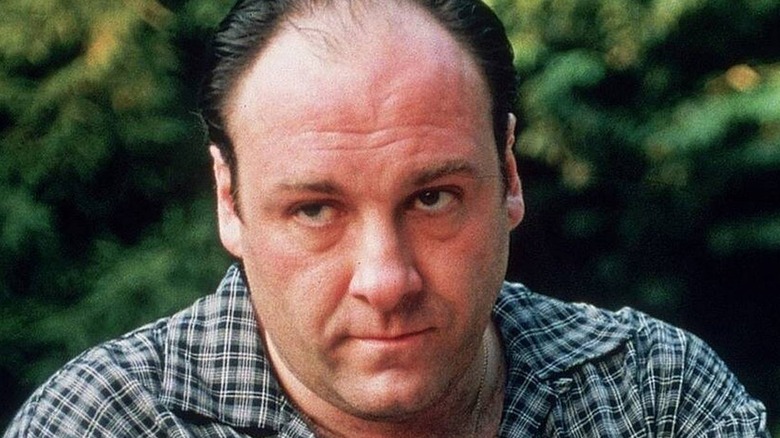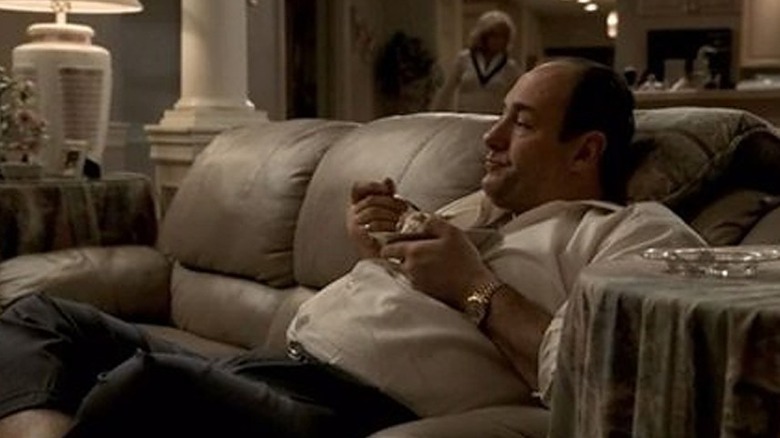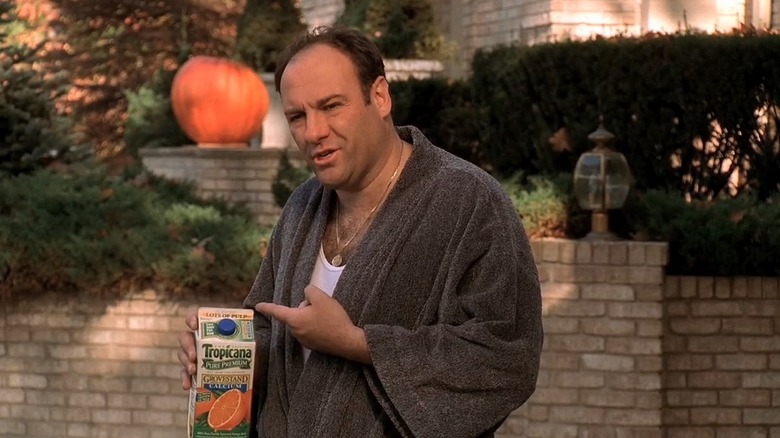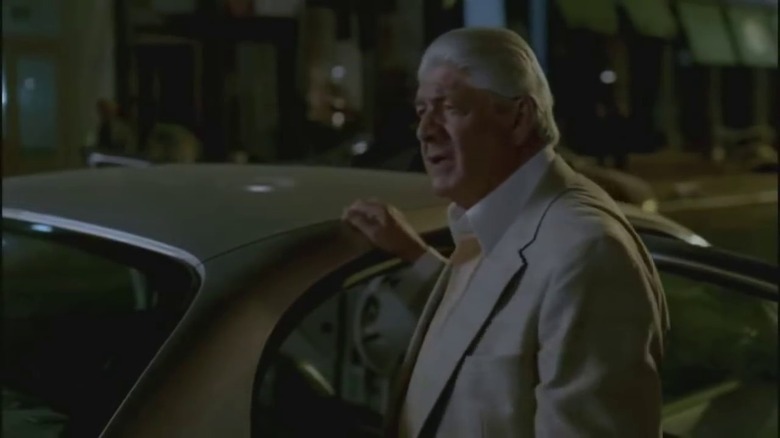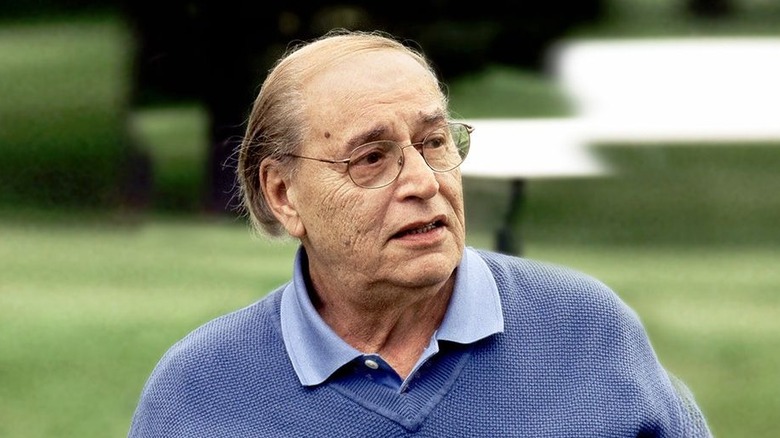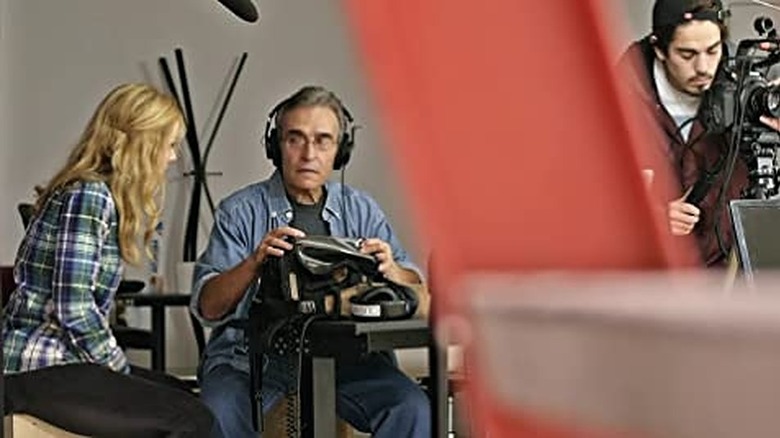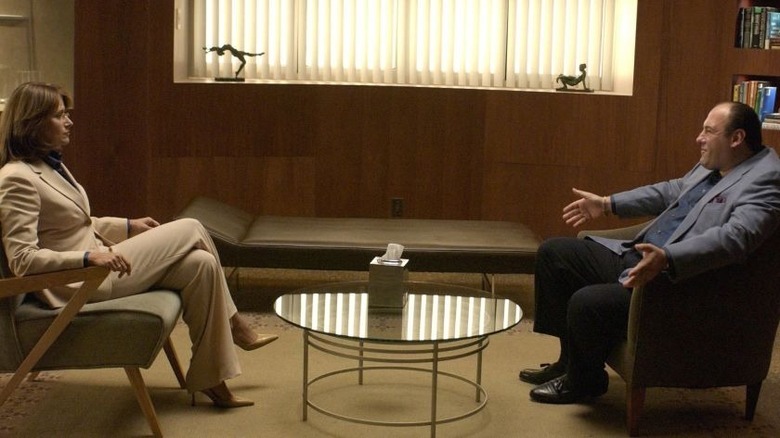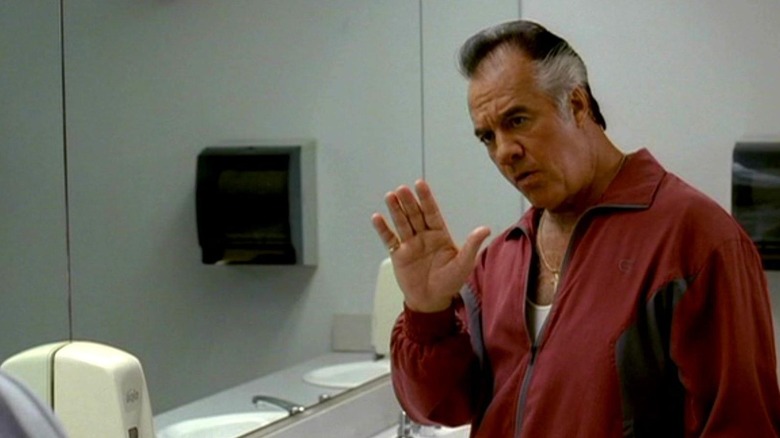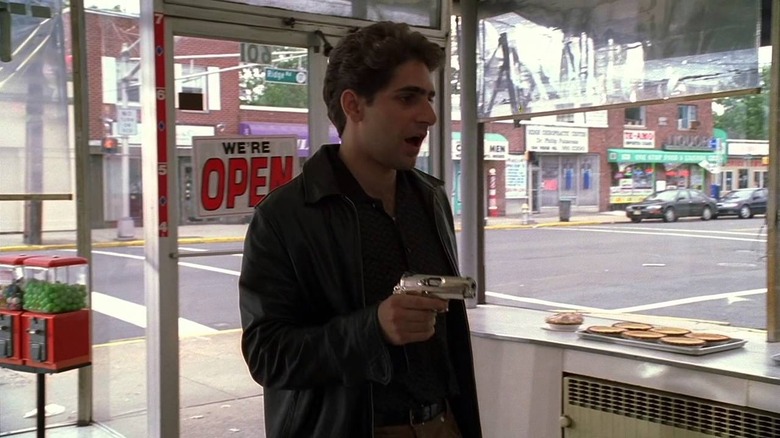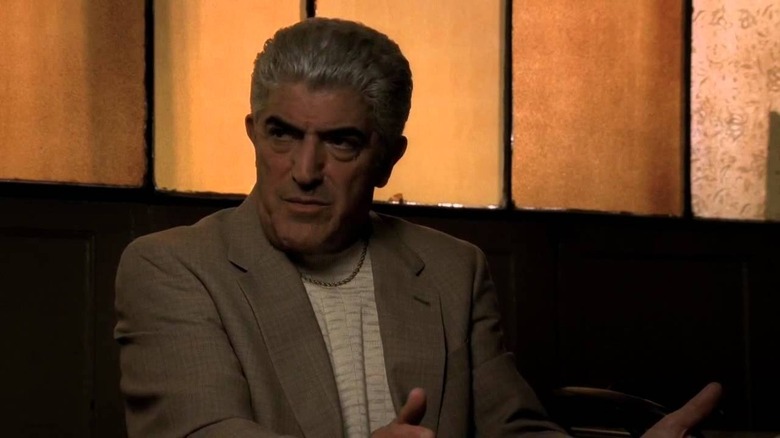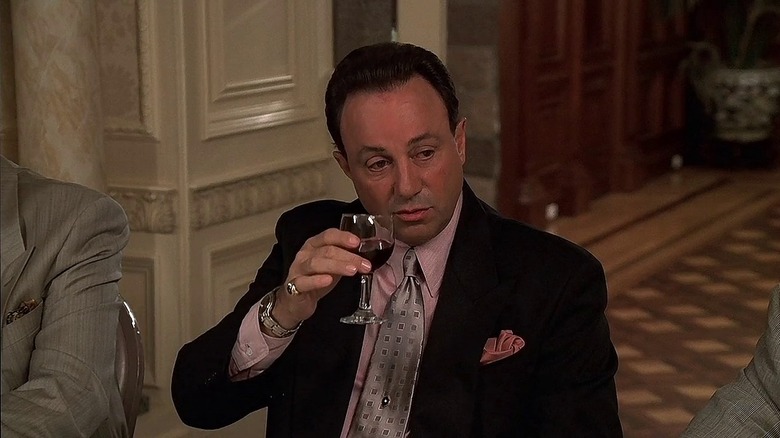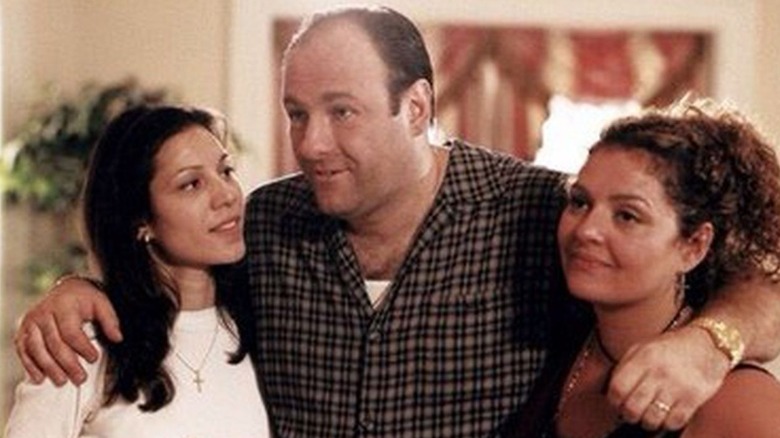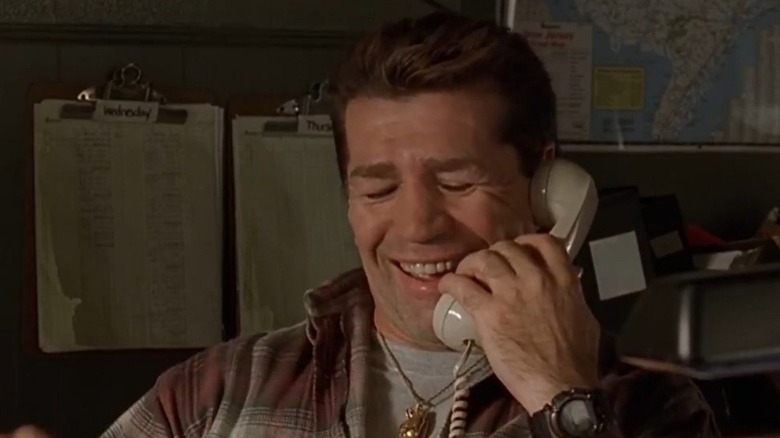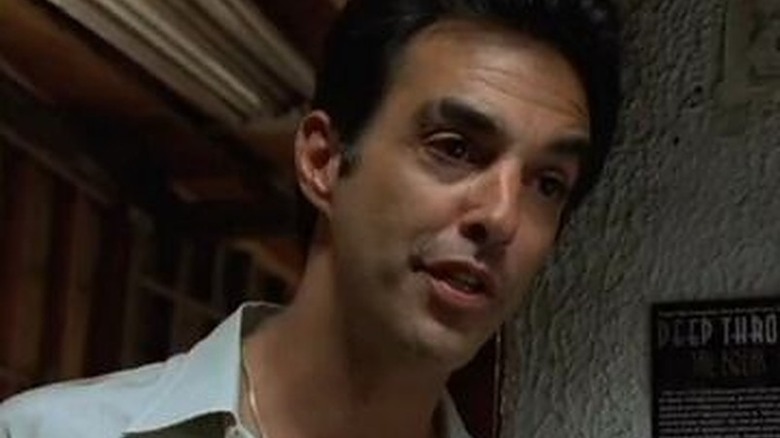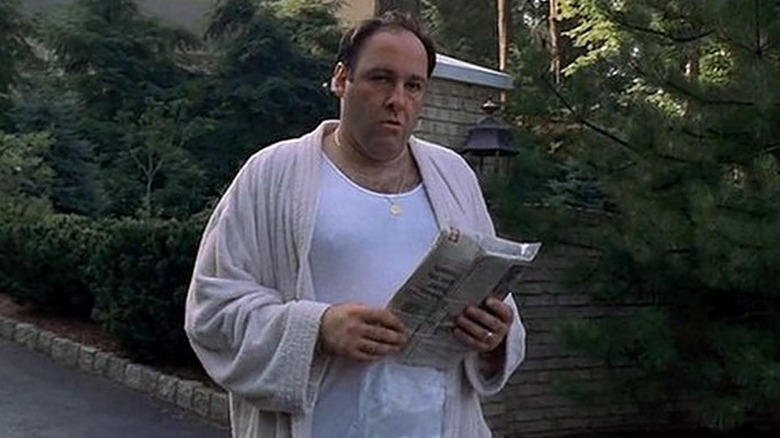The Incredible Connection Between The Sopranos And Goodfellas
If you're a fan of the mob genre, chances are you've seen the classics like "Goodfellas" and "The Godfather" trilogy a few times at least, and even if the genre isn't exactly your bag, you've heard that it's produced some of the greatest works in American cinema. When it crossed over to the small screen, the caliber only increased, as the sprawling narratives of Mafia life found a place to expand and thrive in an even more accommodating medium. Now, wherever you are, HBO's "The Sopranos" is one of the most recognizable titles in television.
Its success owes no small thanks to the canon of gangster films that paved the way — and it gives none. References to the mob movie tradition are plentiful: main character Tony Soprano and his crew share an obsession with "The Godfather," while countless characters emulate tropes from this and other classic films, like "Goodfellas."
While elevating the genre, "The Sopranos" pays homage to it as well, and fans are likely to appreciate everything from common cast members to common themes — like loyalty and Italian culture. "The Sopranos" is an undoubtedly unique and refreshing viewing experience for fans of the genre that, at the same time, doesn't forego the "comforts of home."
Disclaimer: Spoilers for "The Sopranos" and multiple mob movies follow.
The godfather of mob TV
While "The Sopranos" is considered one of the best shows of all time in no small part because of its original approach to a tried-and-true (and sometimes tired) genre, it nonetheless takes a lot of inspiration from predecessors like "The Godfather" (a Tony Soprano favorite) and "Goodfellas."
There are many overt and implied references to both in "The Sopranos," and for good reason: Together, the three works are considered something of an "unofficial trilogy" that marks the evolution of the gangster genre. With "Goodfellas" as the link, these three works bridge the gap between the end of the golden age of cinema and the dawn of the golden age of TV.
The effect of these three properties extends beyond the genre they belong to. Think of some of the most popular, critically-acclaimed television shows of the 2000s and 2010s, dramas with a morally unscrupulous protagonist (like Don Draper in "Mad Men" or Walter White in "Breaking Bad") who's not exactly the most likable, even as you can't help but root for him either.
The tension of the narrative is built-in, because we have to confront the conflict between our love for the characters (who are often excruciatingly well-developed) and our condemnation of their actions. "The Sopranos" was able to achieve this level of nuance in large part because of the long tradition that came before it, a tradition it honors well.
Setting the scene
Between the two chief cinematic influences on "The Sopranos," the impact of "The Godfather" is particularly obvious. Tony and the crew love the movie, and in particular, Tony's love of the film is used to expose crucial aspects of his personality and even to foreshadow elements of the plot. For example, one of Tony's favorite scenes is the one in which Michael comes out of the bathroom to kill Sollozzo and the corrupt police captain McCluskey. Some have argued that the ambiguous final scene of the HBO series is a homage to that sequence.
Speaking of matters of life and death, Tony buys orange juice right before a near-fatal attempt on his life, and slowly eats an orange at the beginning of that final episode ... A callback to how oranges are a motif that often foreshadow violence or danger in the "Godfather" trilogy. Vito shops for oranges during an assassination attempt, Sonny drives past a billboard for oranges just before his demise, and Michael and Vito die with an orange in the hand and an orange peel in the mouth, respectively. You'd think that, for such a big fan of the trilogy, Tony would steer clear of oranges at all costs.
But not all of the allusions to "The Godfather" are so subtle and suggestive: Most are pretty thinly veiled. Silvio Dante quotes many of Al Pacino's lines from the trilogy. Paulie's horn plays the "Godfather" theme song ... And the list goes on.
All in the family
While the connections between "The Sopranos" and "The Godfather" seem very overt, there are many between the show and another of its inspirations, Martin Scorsese's "Goodfellas," that take a bit of a keener eye to catch. For one thing, the show and the movie share a total of over two dozen actors: You may have heard a smaller number before, which counted major roles only, but every cast member, even background actors, contributes to the unique sense of atmosphere achieved by both the film and the TV show.
When you count up all of those indispensable contributions, no fewer than 27 actors appeared in both "The Sopranos" and "Goodfellas," meaning that the two share not only a genre, but their own micro-universe of Italian-American influence and generic traditions.
Frank Albanese appeared as a mob lawyer representing Henry in "Goodfellas," having appeared in that film as well as "The Godfather: Part III" in the same year (1990). In "The Sopranos," Albanese played Tony's Uncle Pat. Paul Herman, who has appeared in Scorsese movies "Goodfellas," "Casino," and "The Irishman," played the dealer in "Goodfellas" who was known as "the Pittsburgh Connection." In "The Sopranos," his character also started out as a drug dealer. And Daniel P. Conte played a "doctor" of sorts in both productions (and is one in real life!): briefly, he appeared as "Dr. Dan" in "Goodfellas," while on "The Sopranos" he played Faustino "Doc" Santoro ... though he couldn't save himself from getting "whacked."
Give them some Lip
Rather than try to distance itself from its by-some-accounts-overdone genre, "The Sopranos" embraced it, not just by referencing other gangster movies, but by casting primarily Italian-American actors — another reason for its pronounced overlap with "Goodfellas" — and even creating a gangster-slasher-film-within-a-gangster-TV-show ("Cleaver").
This means that the show includes a lot of classic mob movie stars you may recognize, most often from "Goodfellas," but many times from multiple other Mafia movies. Actor Frank "Tony Lip" Vallelonga Sr. was especially prolific: He starred not only in "The Sopranos" and "Goodfellas," but in no fewer than 10 films in the gangster genre, including "The Godfather" as well.
While Lip's role was in the lower level of a crime family in "Goodfellas," he moved up in the ranks by the time he appeared on the HBO series as the first Lupertazzi family boss in "The Sopranos." And speaking of stepping up, even Lip's role in Hollywood was a step up from his days of waiting on clients at New York City's famous Copacabana nightclub, where he met stars like Dean Martin, Tony Bennett and Tom Jones.
No, he's not the Tony from the song. But one interesting piece of trivia? When his character, Carmine Lupertazzi, passes away, Tony receives the news during an episode called "Rat Pack" — the name of the informal group of entertainers notably featuring Martin and Frank Sinatra.
The Sopranos wasn't afraid to get self-reflective
In a connection that's almost too "meta" for words, the "Sopranos" tribute to Martin Scorsese goes far beyond sharing actors, themes, and roles with his seminal film. In "Goodfellas," one actor, Anthony Caso, played an uncredited truck hijacker who didn't even have a name, then went on to play a role in "The Sopranos" that was anything but nameless.
Many actors from "Goodfellas" later enjoyed much more illustrious, fully realized roles in "The Sopranos," having seemingly grown up along with their genre. While Anthony Caso didn't play a major part in the plot of "The Sopranos," per se, it would be insane to call his role small: The actor made a cameo in the HBO series as Martin Scorsese himself!
The role only lasted for one episode, but it's a fascinating callback that works in both the fictional and real worlds, and cements the respect that "The Sopranos" and creator David Chase has for the director ... Even if the real man himself only ever watched one episode of "The Sopranos."
Mob wives and mothers
The lines between the real world and the onscreen world are continuously blurred by a genre that has such a far reach in popular culture. The inclusion of Martin Scorsese in "The Sopranos," a television show whose genre his name is synonymous with, was only the beginning. The influence of "Goodfellas" in Hollywood also had a direct effect on casting "The Sopranos."
Lorraine Bracco from the start wanted a meaningful role like her eventual turn as Tony's therapist in "The Sopranos." She specifically insisted that she didn't want the part of Carmela. Why? After "Goodfellas," in which she played Karen Hill — main character Henry Hill's wife — she was offered roles as Mafia wives and mistresses left and right.
But she didn't want to be typecast. So she turned down the role of Carmela and requested the role of Dr. Jennifer Melfi instead. Her role as Tony's psychiatrist was a critical storytelling device that will go down in history as one of modern television's most significant characters.
Marianne Leone Cooper also elevated her career moving from "Goodfellas" to "The Sopranos." She made a cameo as Tuddy's wife in the former, but graduated to one of her longest and most recognizable onscreen runs in the latter as Christopher Moltisanti's mother.
To be or not to be...a rat
One former actor from "Goodfellas," Tony Sirico, agreed to be in "The Sopranos" only if it was guaranteed that his character wouldn't become a rat. He told Deadline that he was "from the streets" and had "been everywhere," and loathed the idea of playing a rat because he had known a few in his time. "I wouldn't play a rat if you had a gun to my head," was his emphatic explanation. "And if you did put a gun to my head, you better empty it."
He didn't play a rat, but that's not to say no guns were emptied on his watch. Instead, his character, Paulie "Walnuts" Gualtieri, ended up with the highest kill count in the series, doing all kinds of dirty work but never any double-crossing.
Speaking of rats, though, it wouldn't be a mob story without them. Vincent Pastore (who appeared in "Goodfellas" as a blink-and-you'll-miss-it "man with coatrack") played an FBI informant, Salvatore Bonpensiero, in the HBO series. He ultimately got whacked for it... by, among others, Sirico's character. So not only did Sirico avoid becoming a rat, but he made his name taking them out — including a former co-star in Scorsese's classic film.
Turning the tables
"The Sopranos" is known not only for casting many actors from "Goodfellas," but for putting them in similar roles. This, however, isn't always the case: Sometimes the opposite is true, and the character an actor portrays in "The Sopranos" almost directly turns the tables on the person they portrayed in Scorsese's film.
Michael Imperioli, for example, plays a server named Spider in "Goodfellas." He gets himself shot — twice — for accidentally ignoring and later talking back to Joe Pesci's character Tommy DeVito, a loose cannon who takes his aggression out on anyone who rubs him the wrong way. DeVito kills Tommy before he can redeem or avenge his wounds, in a death that is allegedly based on that of a real person.
But his role is reversed in the "next life," so to speak, with one encounter on "The Sopranos" that unmistakably echoes the experience of Imperioli's character in the film. In Season 1, Episode 8 of "The Sopranos," Imperioli's character Christopher Moltisanti acts much like Tommy did toward Spider, shooting a bakery worker in the foot for skipping his number in line just as Tommy exploded on his server for "ignoring" him.
Frank Pellegrino turned the tables on his character a bit, too: He played a mobster in "Goodfellas" and then turned around to play an FBI chief and Tony's nemesis, the type of character who was the antithesis of his "Goodfellas" role.
Role reprisals vs. role reversals
Far more numerous are the characters from "The Sopranos" who didn't shift 180 degrees from their roles in "Goodfellas," but played nearly identical roles in both the TV show and the movie.
Some of the resemblances may seem like slight reaches, like Paul Herman's or Daniel P. Conte's. But others are pretty uncanny. Like Frank Vincent, who in both tales, played a character who got out of jail, returned to the business, and began making enemies of the wrong people. In both cases, this resulted in the demise of the character: Billy Batts in "Goodfellas" and Phil Leotardo in "The Sopranos."
Suzanne Shepherd played the mother-in-law of a main character in both productions, which is a pretty specific role to land, even if the mother of Karen Hill in "Goodfellas" can be seen as a bit more overbearing than the mother of Carmela Soprano in "The Sopranos."
You can find Chuck Low in both "The Sopranos" and "Goodfellas," on the receiving end of threats and violence. He plays motel owner Shlomo Teittleman, who goes back on a deal with Tony and remarkably survives, in the former. In the latter, he portrays another business owner, Morrie, who owns a wig shop and also defies a mobster's orders. This time, he doesn't survive.
The similarities extend to smaller roles too
Even in more minor roles, the creators of "The Sopranos" had a lot of common threads between "Goodfellas" and their show. It lends the series an air of internal consistency: Fans of the genre feel like they can rely on the narrative, characters, and world-building, because even down to background details, the world seems familiar. Of course, this solid foundation also sets the stage for "The Sopranos" to do creative things with and build upon its source material.
Whether it's their stories or personalities that most "ring a bell" between the two productions, the connections are often easy to spot. Tobin Bell, for example, played a disciplinarian role in both: a parole officer in "Goodfellas" and the head of a military school in "The Sopranos." Tony Darrow played a "wise guy" personality in both: bamboo lounge owner Sonny in "Goodfellas," and the much bigger role of Larry Barese, a DiMeo family captain who made recurring appearances throughout the entire "Sopranos" series.
Gene Canfield played a prison guard in Scorsese's film and a police officer in Chase's show, similarly to the way Bell played two disciplinarian roles. And John Ciarcia played a member of Frank Vincent's character's crew in both "The Sopranos" and "Goodfellas."
Female details
While their roles are often not as prominent in the male-dominated HBO series — which in no way discredits the influence of the important female characters – there are a number of female actresses who appeared in both "Goodfellas" and "The Sopranos," contributing an important sense of universality and continuity to the onscreen crime family tradition.
Nicole Burdette had a cameo in "Goodfellas" as Carbone's girlfriend, and she played Tony's sister Barbara on "The Sopranos," appearing in multiple episodes. Angela Pietropinto had a brief turn in "Goodfellas" as Cicero's wife, before appearing as a guest star in "The Sopranos" in the role of Helen Barone, the wife of DiMeo/Soprano crime family associate Dick Barone.
Nancy Cassaro, who played Joe Buddha's wife in "Goodfellas," actually portrayed Christopher's mother for a while on "The Sopranos," before the part was taken over by Marianne Leone Cooper. And Susan Varon, who played a character with her own first name in "Goodfellas," went on to take the role of a realtor on the HBO show.
Even more familiar faces
While many of the aforementioned actors took on bigger roles in "The Sopranos" after "Goodfellas" — rising through the ranks, so to speak — Frank Adonis went in the opposite direction: from playing real-life mobster Anthony Stabile in Scorsese's film to an unnamed "Guest #1" in the HBO show. He's a mob movie staple regardless, though, and appeared in several other Scorsese films.
Vito Antuofermo also played roles in multiple mob movies, from "The Godfather III" to "Goodfellas." He brought his real-life experience as a boxer to his role as a prizefighter in "Goodfellas," and went on to play Bobby Zanone, who managed a garbage transfer station/drug front in "The Sopranos."
The fact that there were so many small roles in "The Sopranos" that drew from characters both large and small in "Goodfellas" speaks to the level of authenticity that Chase and his team were intent on cultivating. The show, undoubtedly oriented toward fans of the genre who would pick up on the countless details that connected to its history, was made even more real with a cast of familiar faces, no matter where they appeared.
The tried-and-true crew
Three actors played parts in Henry's crew in "Goodfellas" and then went on to appear in small roles in "The Sopranos": Apparently, it's a lucrative line of work to get into (playing a gangster, not being one), and even if you never graduate to playing massively recognizable mob roles, you can rely on your name coming up when it's time for a new project in the genre. Anthony Alessandro played a member of Henry's crew in the film and a waiter in the TV series — small roles in big parts of entertainment history.
Victor Colicchio's career was impacted far beyond "The Sopranos" by the friendships and connections he made: One of his most well-known screenwriting credits is for 1999's "Summer of Sam," with he co-wrote with fellow "Sopranos" and "Goodfellas" actor Michael Imperioli. In Scorsese's film, Colicchio played a member of Henry's crew, and in the HBO series, he was a mechanic named Joe.
Gaetano LoGiudice actually auditioned for the part of young Vito Corleone in "The Godfather Part II" when he was only eight years old. He didn't get the role, but he did go on to appear in a number of mob movies and TV shows, including playing a member of Henry's crew in "Goodfellas" and a patron of various businesses in "The Sopranos."
Tone-y Soprano
Due to the shared cast members and thematic material, there are all kinds of veiled references to "Goodfellas" in the HBO series. One repeatedly used motif is that of Tony Soprano walking down his driveway in his bathrobe, an action also performed by Henry Hill in the final scene of "Goodfellas" as he traipses up to his mailbox.
The tone is admittedly different: Henry Hill (Ray Liotta) in "Goodfellas" does this to showcase his reformed suburban lifestyle and the monotony of his accepted existence. Nonetheless, the callback is clear to fans — and Tony's performance of this mundane act may be a subtle way of pointing out that by the time of the show's events, the golden age of organized crime, as in "Goodfellas," is over (just as it was over for Hill individually).
Even the age of the organized crime film is, at least from the perspective of its pioneers, in something of a decline. This is why Scorsese only watched one episode of "The Sopranos": He said he couldn't identify with the new generation's perspective on the genre. From "Goodfellas" to "The Sopranos" and beyond, the mob story has arrived at a place of bittersweet nostalgia: as "The Sopranos" did, it draws from its ancestors and preserves its legacy, while at the same time creating something new.
